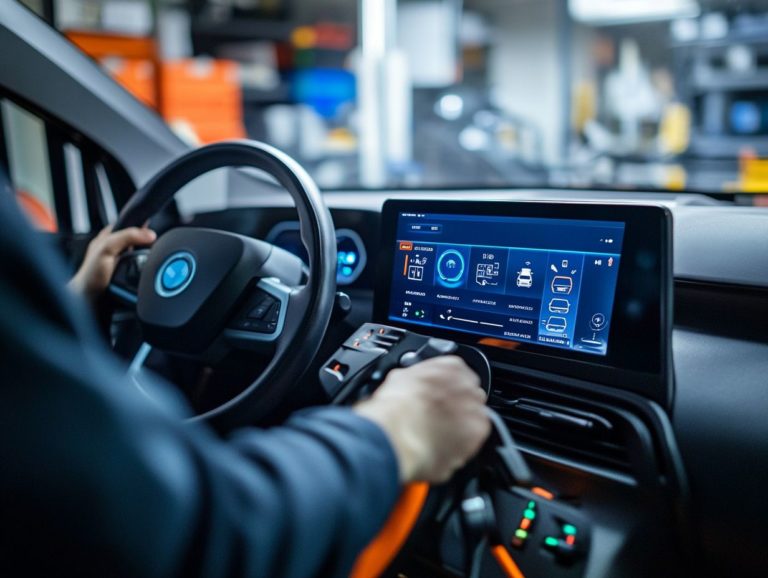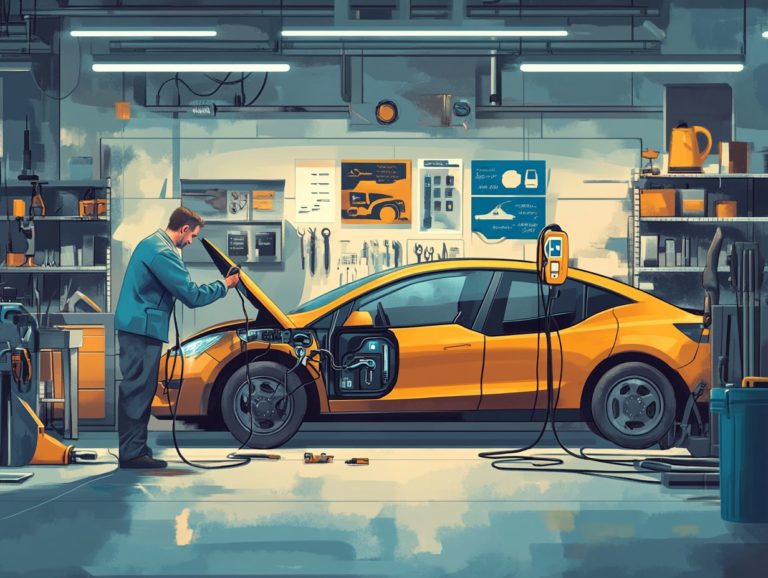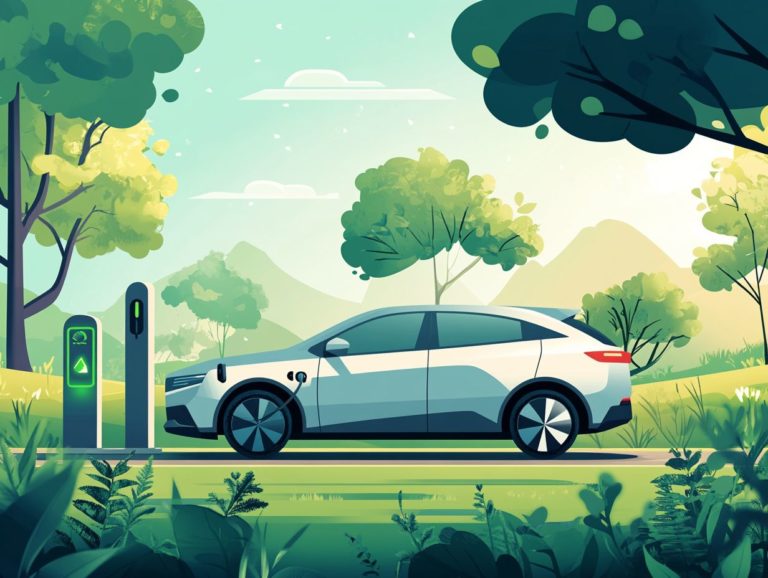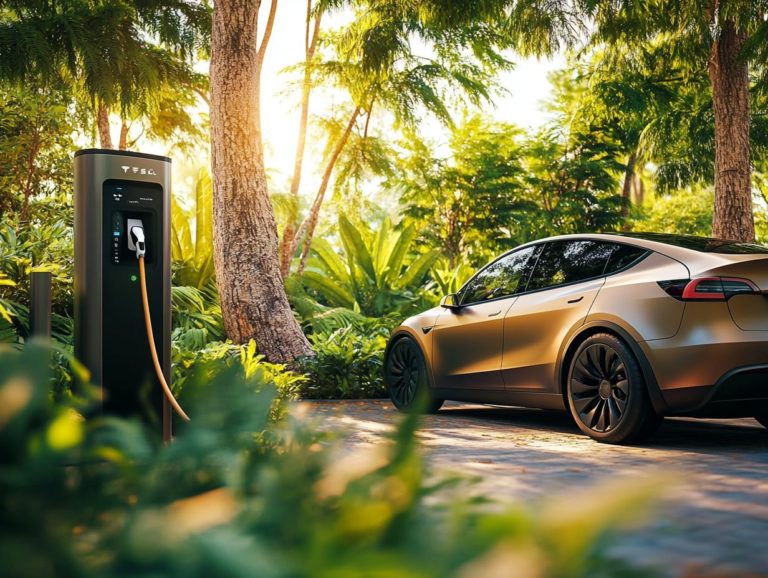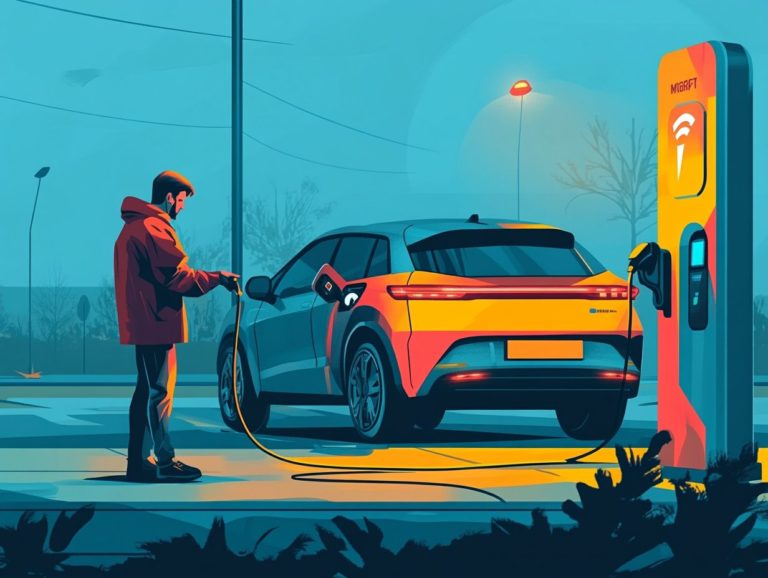Understanding Different EV Maintenance Needs
Maintaining your electric vehicle (EV) is essential for ensuring its longevity and optimal performance.
Unlike traditional cars, EVs come with unique components that demand specific care, such as monitoring battery health, rotating tires, and inspecting the brake system.
This guide outlines the essential maintenance tasks that every EV owner should prioritize, including strategies for effectively monitoring specialized features.
You’ll also find tips for creating a maintenance schedule designed to keep your vehicle operating at peak efficiency.
Get ready to take your EV experience to the next level!
Contents
- Key Takeaways:
- The Importance of Regular Maintenance for Electric Vehicles (EVs)
- Common Maintenance Needs for EVs
- Special Considerations for EV Maintenance
- How to Create an Effective Maintenance Schedule for Your EV
- Frequently Asked Questions
- What are the different types of EV maintenance needs?
- Do all EVs require the same maintenance?
- What is the most important maintenance task for ensuring long-term performance of an EV?
- Are there any unique maintenance needs for hybrid EVs?
- How often should I schedule maintenance for my EV?
- Can I perform maintenance on my EV myself?
Key Takeaways:
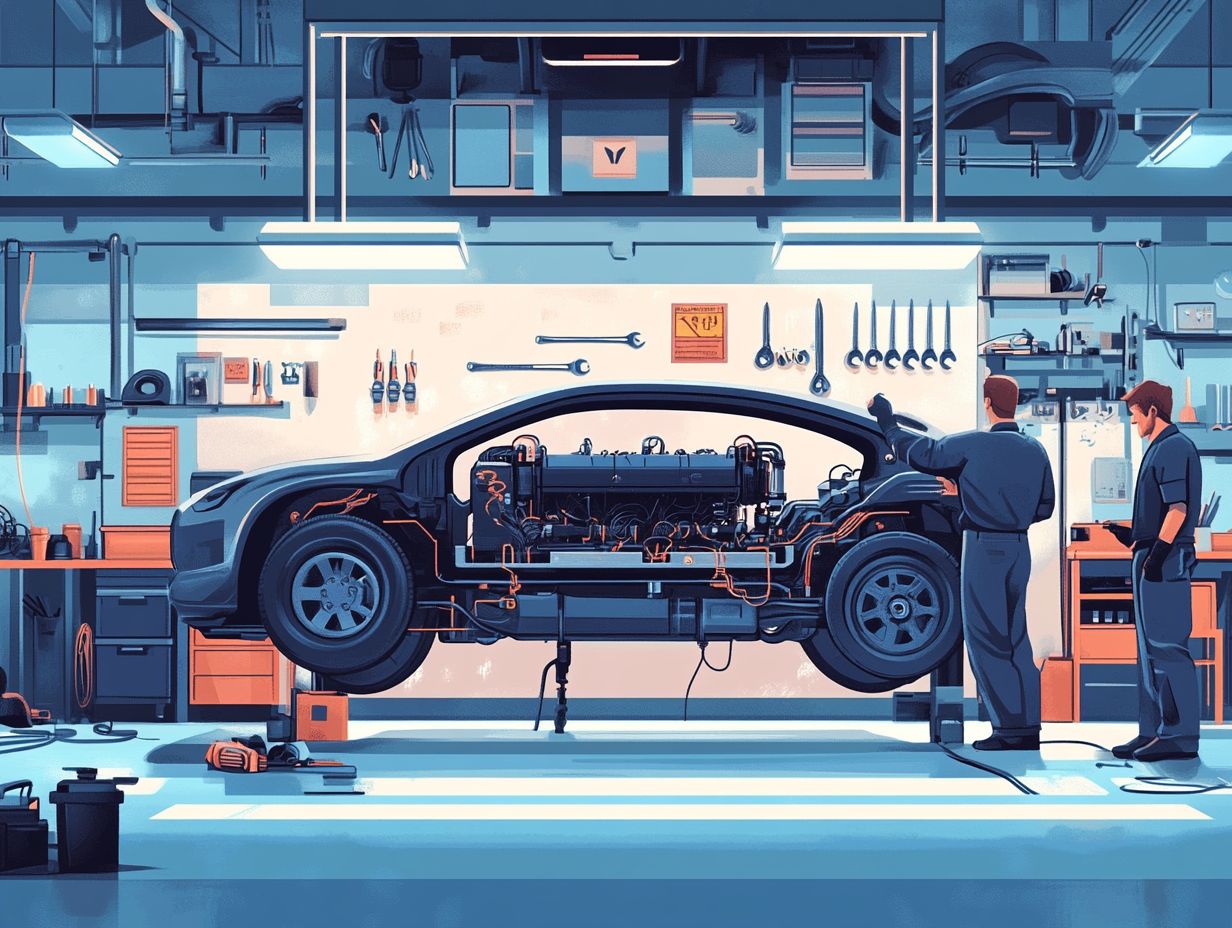
- Regular maintenance is crucial for optimal performance and longevity of EVs.
- Key maintenance needs for EVs include battery care and replacement, tire maintenance and rotation, brake system inspections, and charging port and cable maintenance.
- Creating a maintenance schedule and staying on top of tasks is essential for proper upkeep of EVs.
The Importance of Regular Maintenance for Electric Vehicles (EVs)
Regular maintenance for electric vehicles (EVs) is essential for ensuring optimal performance, extending battery life, and upholding safety standards. To learn more about this aspect, understanding EV maintenance costs can be very helpful.
Unlike traditional internal combustion engine vehicles, EVs like the Nissan Leaf and Chevrolet Bolt require specialized attention to their unique components, such as the batteries in your vehicle and braking systems that help recharge the battery.
Following a well-structured maintenance schedule helps you address the specific needs of your EV, and understanding the different types of EVs available can ultimately impact your overall maintenance costs and compliance with vehicle warranties.
Grasping these factors will significantly enhance the longevity and efficiency of your EV.
Why Maintenance Matters for EVs
Understanding the significance of maintenance for electric vehicles is crucial for you as an EV owner. For more insights, check out understanding EV warranty and maintenance. Neglecting this can lead to decreased battery life and safety risks.
This reality emphasizes the necessity of regular checks and adhering to specific maintenance schedules designed for electric vehicles.
When you overlook essential upkeep tasks, like battery inspections and software updates, you inadvertently shorten your vehicle’s battery lifespan and increase the chances of performance-related issues.
By committing to a proactive maintenance routine, you can enjoy considerable cost savings over time.
Regular maintenance not only enhances your vehicle’s reliability but also ensures it operates within safety standards, providing you with peace of mind and elevating your overall driving experience.
Common Maintenance Needs for EVs
For electric vehicles, you ll find that regular maintenance encompasses vital tasks like battery care, tire upkeep, brake system inspections, and ensuring the charging port and cables remain in top-notch condition.
Prioritizing these areas will help keep your vehicle performing at its best and extend its longevity.
Battery Care and Replacement
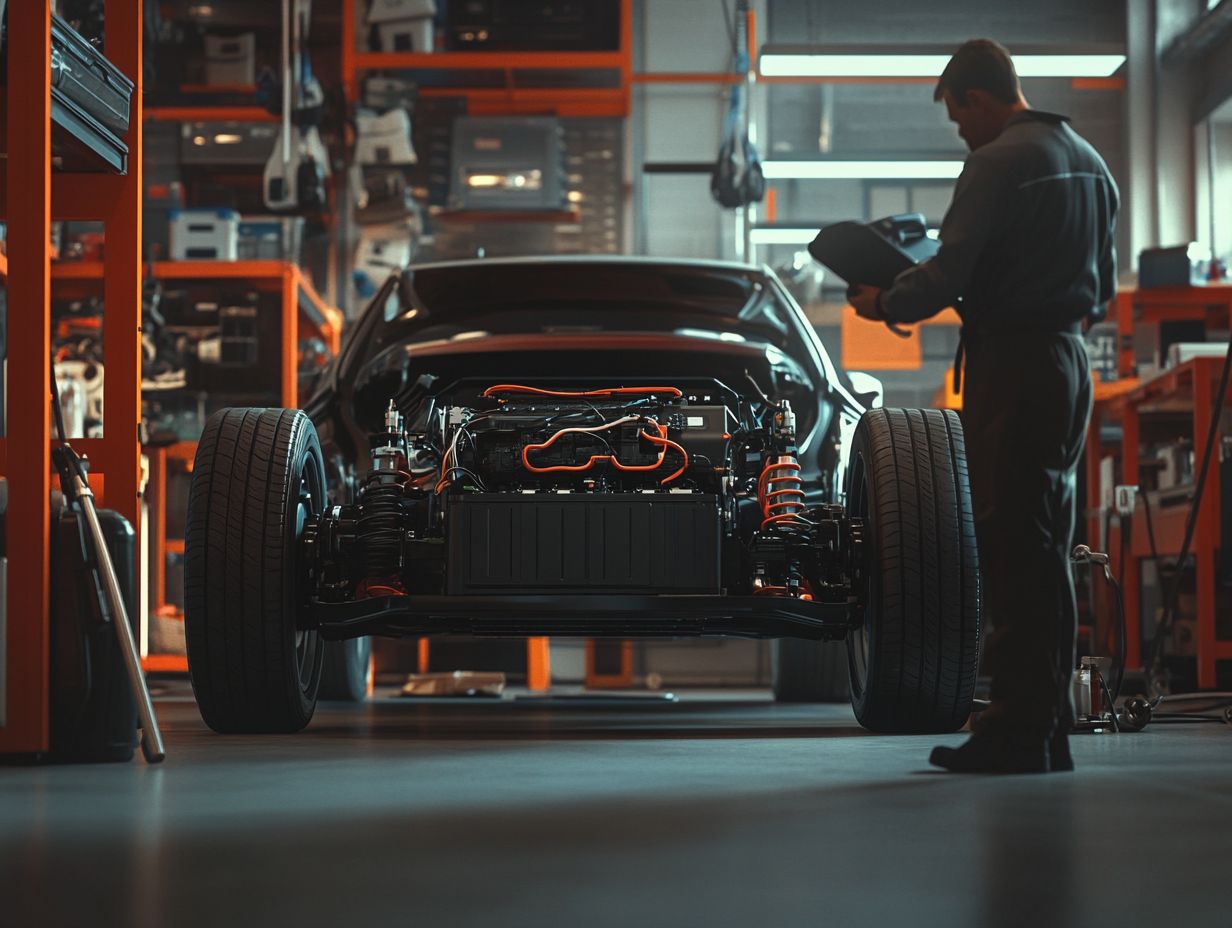
Proper battery care is crucial for maximizing the lifespan and efficiency of your battery electric vehicle, ensuring that your battery packs deliver optimal performance over time.
By adopting effective charging habits, monitoring temperature conditions, and recognizing early signs of battery degradation, you can significantly extend the life of your battery.
It s advisable to charge your electric vehicle during moderate temperatures, steering clear of extreme heat or cold since these conditions can negatively impact overall performance.
Paying close attention to charge cycles can help you avoid unnecessary wear. If you notice signs of battery degradation, it’s essential to explore replacement options that align with your driving needs, carefully considering both costs and potential performance enhancements.
Following these maintenance tips will deepen your understanding of how to keep your battery operating efficiently, ultimately leading to a more reliable and cost-effective electric vehicle ownership experience.
Start your maintenance routine today to protect your investment!
Tire Maintenance and Rotation
Tire maintenance is essential for your electric vehicle. Ensuring proper tire pressure and regular rotation is key to your safety and efficiency on the road.
Maintaining the right tire pressure enhances your vehicle s efficiency, giving you the benefit of extended battery life. It also boosts grip and handling. This is especially vital for electric vehicles, which depend on optimal traction for peak performance.
Rotating your tires at recommended intervals helps evenly distribute wear. This promotes longer tread life and improved overall vehicle balance. By prioritizing these maintenance practices, you can enjoy a smoother ride, better handling, and enhanced safety, all while maximizing the longevity of your electric vehicle’s components.
Brake System Inspections
Regular brake system inspections are crucial for electric vehicles. Many of them employ regenerative braking technology, significantly influencing overall braking efficiency.
Unlike traditional braking systems that rely solely on friction to stop a vehicle, regenerative braking captures energy during deceleration and redirects it to recharge the battery. This innovative method boosts your vehicle’s range and minimizes wear on standard brake components.
Routine inspections are essential to ensure both safety and peak performance. During these check-ups, take the following important steps:
- Examine brake pads for wear and tear
- Inspect fluid levels
- Evaluate the condition of the regenerative braking system
These proactive measures not only maintain safety standards but also extend the life of your braking system.
Charging Port and Cable Maintenance
Maintaining your charging port and cable is essential as an electric vehicle owner. A well-kept charging system guarantees efficient energy transfer and extended longevity.
Regular inspections of the charging port allow you to spot any debris or corrosion that might hinder the connection. Clean the port gently with a soft, dry cloth. Avoid using liquids that could cause damage.
Check the cables for frays or worn-out sections regularly to prevent performance issues and safety risks. By following these maintenance tips, you extend the lifespan of your charging equipment and enhance your electric vehicle s overall performance, ensuring it remains a dependable mode of transportation.
Special Considerations for EV Maintenance
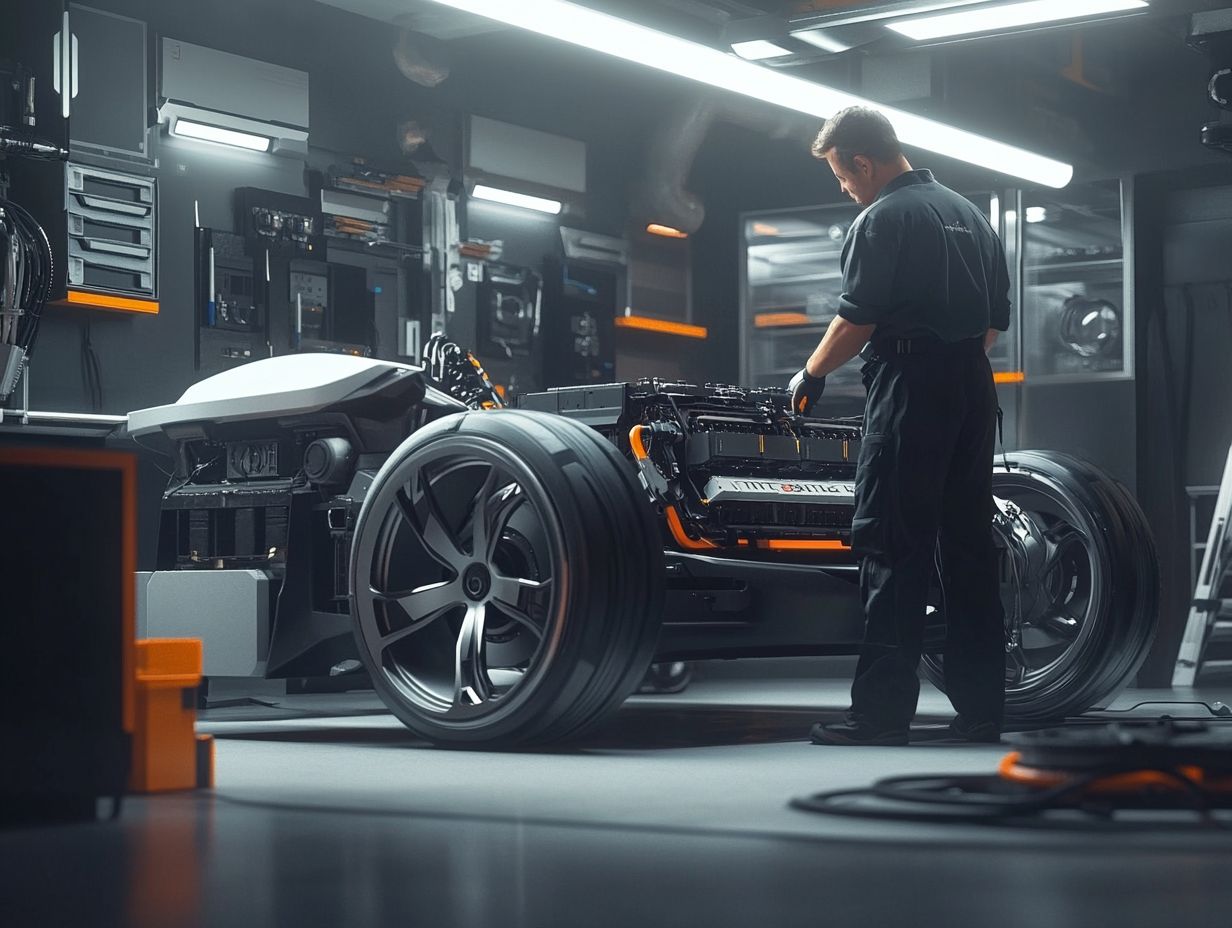
When it comes to electric vehicle maintenance, you must consider their unique features and components. This means adopting tailored approaches for both upkeep and inspections to ensure optimal performance, including understanding the maintenance needs of EVs.
Unique Features and Components to Monitor
Monitoring the unique features and components of your electric vehicle is crucial. Elements like battery packs and regenerative braking systems need to operate at peak performance.
These advanced systems require a different approach than what you’re used to with traditional vehicles, where routine oil changes and exhaust checks are commonplace. Understanding aspects like charging cycles and how the vehicle keeps its battery at the right temperature will significantly enhance your vehicle’s performance.
For example, watching for signs of battery degradation like fluctuating range estimates can be immensely helpful. Regularly checking your brakes is equally vital, as they rely heavily on regenerative features that wear differently compared to conventional brakes.
Lastly, don t overlook the importance of regular software updates. These updates can improve both efficiency and performance, making them essential for your maintenance checklist as an electric vehicle owner.
How to Create an Effective Maintenance Schedule for Your EV
Establishing a robust maintenance schedule for your electric vehicle is essential. Doing so helps anticipate maintenance needs, ensures adherence to warranty requirements, and effectively manages your maintenance costs. This proactive approach enhances the longevity of your vehicle and safeguards your investment in the long run.
Start your maintenance plan today to enjoy a safer and more efficient ride!
Tips for Staying on Top of Maintenance Tasks
Keep your electric vehicle in top shape by adopting a proactive approach. Use effective tips to boost battery life and overall performance.
To manage these tasks successfully, use tools and apps designed for vehicle maintenance. Many of these platforms offer customizable scheduling options that send reminders for regular checks.
Tracking tire pressure, fluid levels (including coolant and brake fluid), and battery health at routine intervals is vital. Utilizing a maintenance app can provide valuable insights into your vehicle’s efficiency over time, enabling you to pinpoint areas for improvement.
By reviewing these insights regularly, you’ll make smart choices. This not only extends your vehicle’s lifespan but also maximizes its performance!
Frequently Asked Questions
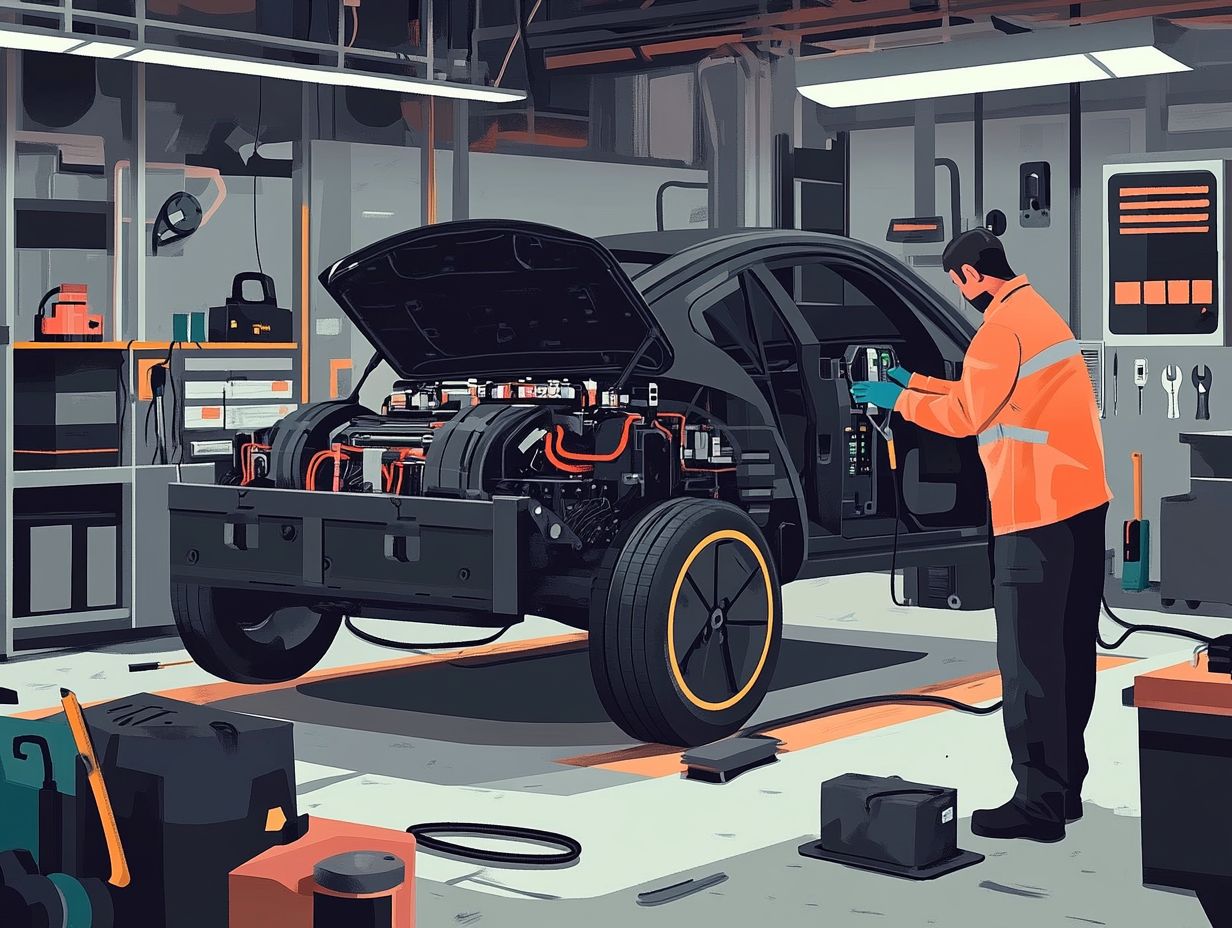
What are the different types of EV maintenance needs?
Regular tasks include tire rotations and brake pad replacements. Specialized maintenance is also needed for the electric motor, battery, and charging system.
Do all EVs require the same maintenance?
No, maintenance needs differ between EV models. Always check the owner’s manual for specific requirements, and consider referring to understanding EV regulations and maintenance for additional guidance.
What is the most important maintenance task for ensuring long-term performance of an EV?
Regular battery servicing is crucial. Monitor battery health and charging habits, and replace the battery when needed.
Are there any unique maintenance needs for hybrid EVs?
Hybrid EVs need maintenance for both the gasoline engine and the electric motor, which is different from all-electric or traditional vehicles. To ensure proper care, it’s important to understand EV electronics and maintenance.
How often should I schedule maintenance for my EV?
Maintenance frequency can vary. Generally, follow the manufacturer’s recommended schedule, which may include annual check-ups or every 10,000-15,000 miles.
Can I perform maintenance on my EV myself?
Some basic tasks can be done at home. However, for specialized needs, it’s best to consult a certified technician to maintain warranty coverage.

